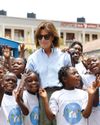Prøve GULL - Gratis
Batten Down The Hatches
Forbes Africa
|October 2017
Private money could take the hardest hit from plans for free health for all. What shape is the private health business in to stand up to this?

Twenty eight million. That’s the number of people in Africa who will die from cardiovascular illness, diabetes, and other non-communicable diseases, according to the World Health Organization. That’s 46% of all deaths in Africa by 2030. Half of these deaths, according to a 2017 article in the BMC Public Health journal, are because hospitals aren’t good enough.
“Large numbers of our people continue to die prematurely and to suffer unnecessarily from poor health. Treatable conditions are not being treated on time and preventable diseases are not being prevented,” says South Africa’s Health Minister Aaron Motsoaledi on his department’s website.
It is because times are tough in South Africa. Gross domestic product growth was -0.7% in the first quarter of 2017, while unemployment increased to 27.7%. Medical aid cover is expensive. It costs about R4,500 ($340) a month, on average, for a family of four. That is almost half of South Africa’s average salary of R10,680 ($815) per month, according to BankservAfrica. It means a mere eight million people, out of 55 million, can afford cover.
To make matters worse, last year, 16 of the top 20 medical aid schemes had to reach into investment funds to stay afloat. It also meant that, this year, scheme members received price increases, on their cover, far higher than consumer price inflation.
It is so bad the South African government wants to start National Health Insurance (NHI), the first step to free healthcare for all, by 2025, bankrolled by the tax payer.
Denne historien er fra October 2017-utgaven av Forbes Africa.
Abonner på Magzter GOLD for å få tilgang til tusenvis av kuraterte premiumhistorier og over 9000 magasiner og aviser.
Allerede abonnent? Logg på
FLERE HISTORIER FRA Forbes Africa
Forbes Africa
AI: A LADDER TO PROGRESS OR A TRAP OF DIVISION? THE CHOICE IS OURS
Artificial intelligence (AI) is not a neutral force. It is an amplifier. It can magnify our brightest innovations or our darkest biases. It can serve as a ladder for human development or a trap that widens inequality. The path it takes is not pre-programmed by algorithms; it will be determined by the choices we make about trust, capability, and cooperation.
3 mins
October - November 2025

Forbes Africa
Lady Mary Dinah: The Philanthropist Redefining Wealth And Purpose On A Global Scale
Lady Mary Dinah, officially the Lady of Ellington, is a distinguished food and nutrition expert, humanitarian, and philanthropist reshaping global aid and advancing food security, especially within Africa's most vulnerable regions. Through Mary Dinah Foundation and pioneering initiatives such as the Maternal and Newborn Fund, she is bridging the gap between innovation and community impact.
2 mins
October - November 2025

Forbes Africa
Red Socks Golf Day Rallies Support For Ronald McDonald House Charities
The annual Red Socks Golf Day, hosted in partnership with McDonald's South Africa suppliers, took place in Johannesburg on August 28, raising significant funds for the continued operation of Ronald McDonald House Charities (RMHC) South Africa. This longstanding event highlights the power of collaboration and shared purpose, ensuring that families can find comfort and support during their most difficult times. RMHC South Africa is an independent nonprofit organization governed by a Board of Directors and operated by dedicated staff and volunteers. Its mission is to create, find, and support programs that directly improve the health and well-being of children and their families.
2 mins
October - November 2025

Forbes Africa
Unleashing The Potential Of Every Child: Committing To Sustainable And Transformative Philanthropy
Founded in 1963 by Princess Grace of Monaco and now chaired by H.R.H. Princess Caroline of Hanover, AMADE-Association Mondiale des Amis de l'Enfance (World Association of Children's Friends)-defends an ambitious and deeply human vision: a world where every child, regardless of their social, religious, or cultural background, can live with dignity, in safety, and with respect for their fundamental rights, and become an actor in their own life.
2 mins
October - November 2025
Forbes Africa
AFRICA'S TECH GROWTH NEEDS MORE THAN VCS-IT NEEDS CORPORATES
At the AWS Summit in Johannesburg in August, I sat down with Christophe Viarnaud, founder of AfricArena, to unpack the state of African tech. Few know the terrain better: his platform runs summits across four continents and publishes one of the most widely-read reports on venture capital in Africa.
2 mins
October - November 2025

Forbes Africa
REEF RELIEF
AFTER THE WORLD-FIRST BLUE BOND IN 2018, EFFORTS ARE NOW UNDERWAY IN THE ISLAND NATION OF SEYCHELLES TO RESTORE BLEACHED REEFS AND SUSTAIN ITS BLUE ECONOMY.
3 mins
October - November 2025
Forbes Africa
Redefining Startup Growth In Africa
Across Africa, startups often ignite with promise but stumble in execution. One emerging company believes it has developed the infrastructure needed to change the odds.
3 mins
October - November 2025

Forbes Africa
The True Purpose: Building Futures
IT'S TIME TO SHIFT THE LANDSCAPE. WHAT IF WE FOCUSED GLOBAL FOOD AID AND PHILANTHROPY ON PROVIDING THE NUTRITION ESSENTIAL TO A CHILD IN THE FIRST 1,000 DAYS? THE IMPACT COULD BE TRANSFORMATIONAL.
2 mins
October - November 2025

Forbes Africa
RUGBY, ROOTS AND RESPONSIBILITY
MEET THE RISING GLOBAL RUGBY LEAGUE TALENT MAKING CAMEROON PROUD.
2 mins
October - November 2025
Forbes Africa
UBUNTU IN ACTION: BRIDGING TRADITION AND INNOVATION FOR COMMUNITY EMPOWERMENT
Although the word is derived from southern African Nguni languages, the concept of Ubuntu finds roots across Africa. Of course, while there are direct translations, Ubuntu really represents an ethic of interdependence, where the flourishing of the individual and the wellbeing of the community are seen as mutually reinforcing rather than opposed. In advocating for what he refers to as 'Ubuntu Stoicism', Tiisetso Maloma argues: \"Ubuntu signals a sense of personal responsibility. The community benefits from the virtues of responsible individuals. They also serve as inspiration to others, particularly the younger generation.\" From the perspective of an academic and head of an institution, there is a distinct connection to be made with the very pursuit of academia.
2 mins
October - November 2025
Translate
Change font size

